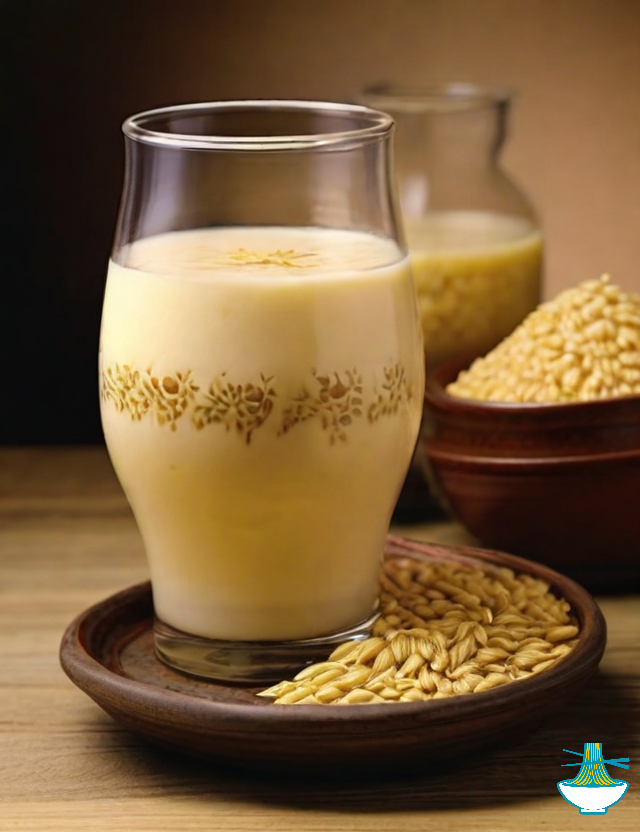Embark on a culinary journey to Bulgaria, where tradition meets flavor in the heartwarming embrace of Boza. A beloved and time-honored beverage, Boza is not just a drink; it's a cultural experience that has been passed down through generations. This thick, fermented cereal beverage is not only a culinary delight but also a symbol of Bulgarian heritage.

In this culinary adventure, we will guide you through the steps of crafting your own batch of Boza, unlocking the secrets of this ancient elixir that has been cherished for centuries. As you immerse yourself in the preparation process, you'll discover the rich tapestry of flavors that define Bulgarian cuisine. So, don your apron, gather your ingredients, and let's embark on a gastronomic exploration that transcends borders and brings the taste of Bulgaria to your kitchen.

Ingredients:
- 1 cup wheat, maize, or rice (choose one)
- 4 cups water
- 1 cup sugar
- 1 tablespoon flour
- 1 tablespoon yogurt (with live cultures)
- 1/4 teaspoon dry yeast
- 1 cinnamon stick
- 3-4 cloves (optional)
- 1 lemon peel (optional)
Instructions:
Prepare the Base:
1-Rinse the wheat, maize, or rice thoroughly.
2-In a large pot, combine the rinsed grain with 4 cups of water. Bring it to a boil and then reduce the heat to a simmer. Cook until the grains are soft and the water has a porridge-like consistency.
Sweeten the Mixture:Add the sugar to the pot and stir until it dissolves completely. Allow the mixture to cool to room temperature.
Activate the Fermentation:
1-In a small bowl, mix the flour with a little water to create a smooth paste. Add this paste to the cooled grain mixture.
2-Incorporate the yogurt and dry yeast into the mixture. Stir well to combine.
Infuse with Flavor (Optional):Toss in a cinnamon stick, cloves, and lemon peel to enhance the flavor. Adjust the quantity based on your preference.
Fermentation Process:Cover the pot with a clean cloth and let it sit in a warm place for about 24-48 hours. This allows the natural fermentation process to occur. Stir the mixture occasionally.
Strain and Serve:
1-Once the Boza has achieved a slightly thick consistency and a mildly sour taste, strain it through a fine mesh sieve or cheesecloth to remove any solids.
2-Refrigerate the liquid to chill it before serving.
Serve and Enjoy:Pour the chilled Boza into glasses and garnish with a sprinkle of cinnamon if desired. Serve it with traditional Bulgarian snacks or enjoy it on its own.
This traditional Bulgarian Boza recipe captures the essence of a centuries-old beverage, combining simplicity with the rich heritage of Bulgarian cuisine. Sip and savor the unique flavors that have been cherished by generations. Cheers to a taste of Bulgaria in your own home!
Nutritional Values
The nutritional values for the ingredients can vary based on specific brands and varieties. However, here's a general estimate for the nutritional content of the listed ingredients:
Wheat, Maize, or Rice (1 cup):
- Calories: 100-150 kcal
- Carbohydrates: 20-30g
- Protein: 2-5g
- Fat: 0-1g
- Fiber: 1-3g
benefits:
- Rich in carbohydrates for energy.
- Contains dietary fiber for digestive health.
- Provides essential nutrients like vitamins and minerals.
Water (4 cups):
- Calories: 0 kcal
- No significant macronutrients
benefits:
- Essential for hydration and overall bodily functions.
- Supports digestion, nutrient absorption, and detoxification.
Sugar (1 cup):
- Calories: 770 kcal
- Carbohydrates: 200g
- No significant protein or fat
benefits:
- Quick source of energy.
- Enhances sweetness and flavor.
Flour (1 tablespoon):
- Calories: 30-40 kcal
- Carbohydrates: 6-8g
- Protein: 1-2g
- Fat: 0-1g
benefits:
- Contributes to the consistency and texture of the beverage.
- Contains some essential nutrients, including B vitamins.
Yogurt (1 tablespoon):
- Calories: 15-20 kcal
- Carbohydrates: 1-2g
- Protein: 1-2g
- Fat: 1g
benefits:
- Adds probiotics that support gut health.
- Supplies protein and calcium.
Dry Yeast (1/4 teaspoon):
- Calories: 5-10 kcal
- Carbohydrates: 1-2g
- Protein: 1-2g
- Fat: 0g
benefits:
- Initiates fermentation, leading to the development of complex flavors.
- Contains B vitamins and minerals.
Cinnamon Stick (1 stick):
- Calories: 6 kcal
- Carbohydrates: 2g
- Fiber: 1g
- No significant protein or fat
benefits:
- Adds a warm, sweet flavor.
- Contains antioxidants and may have anti-inflammatory properties.
Cloves (3-4 cloves):
- Calories: 5-10 kcal
- Carbohydrates: 1-2g
- Protein: 0g
- Fat: 0g
benefits:
- Contributes a rich, aromatic flavor.
- May have anti-inflammatory and antimicrobial properties.
Lemon Peel (1 peel):
- Calories: 5 kcal
- Carbohydrates: 2g
- Fiber: 1g
- No significant protein or fat
benefits:
- Imparts citrusy aroma and flavor.
- Contains vitamin C and antioxidants.
Please note that these values are approximate and can vary. Always check specific product labels for accurate nutritional information, especially if you have dietary restrictions or specific health considerations.


Comments